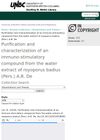 41 citations,
February 2021 in “Cureus”
41 citations,
February 2021 in “Cureus” Dutasteride treatment in men with mild to moderate COVID-19 reduced viral shedding, inflammation, and recovery time without serious side effects.
 39 citations,
January 2015 in “International journal for parasitology/International Journal for Parasitology”
39 citations,
January 2015 in “International journal for parasitology/International Journal for Parasitology” Epidermal keratinocytes start wound healing and inflammation after schistosome infection.
 13 citations,
September 2019 in “Scientific Reports”
13 citations,
September 2019 in “Scientific Reports” High levels of the protein Flightless I worsen ulcerative colitis symptoms in mice.
 April 2020 in “Research Square (Research Square)”
April 2020 in “Research Square (Research Square)” Women with PCOS may have a reduced ability to fight breast tumor cells over time.
 April 2017 in “Journal of Investigative Dermatology”
April 2017 in “Journal of Investigative Dermatology” Fisetin may help treat psoriasis and reduce skin inflammation.
 April 2017 in “Journal of Investigative Dermatology”
April 2017 in “Journal of Investigative Dermatology” The protein CTCF is essential for skin development, maintaining hair follicles, and preventing inflammation.
 6 citations,
December 2017 in “Molecular Medicine Reports”
6 citations,
December 2017 in “Molecular Medicine Reports” Wnt5a may contribute to psoriasis by reducing skin cell growth, blocking skin cell maturation, and increasing inflammation.
 70 citations,
February 2019 in “The journal of immunology/The Journal of immunology”
70 citations,
February 2019 in “The journal of immunology/The Journal of immunology” Short-chain fatty acids from *Cutibacterium acnes* cause skin inflammation, contributing to acne.

The reviewers suggest clarifying the abstract, adding background on inflammation's effect on stem cells and cancer, discussing immune cells' role in tumors, and considering inflammation's potential to reduce cancer growth.

The revised study on how inflammation affects cancer stem cells was accepted after improving clarity and structure.

The reviewers suggest clarifying and expanding on the role of inflammation in stem cell-related cancer development.

The reviewers found the manuscript on inflammation's role in cancer stem cells to be relevant but suggested it needs clarity, more background information, discussion on immune cells' role in tumors, updated references, and grammar corrections.
 20 citations,
December 2013 in “Journal of Dermatology”
20 citations,
December 2013 in “Journal of Dermatology” UV-B light increases inflammation-related substances in acne-related skin cells.
 5 citations,
January 2022 in “Molecular Medicine Reports”
5 citations,
January 2022 in “Molecular Medicine Reports” Pine bark extract helps mice grow hair by reducing inflammation and boosting growth factors.
 July 2022 in “The journal of investigative dermatology/Journal of investigative dermatology”
July 2022 in “The journal of investigative dermatology/Journal of investigative dermatology” Particulate matter causes inflammation in hair cells, potentially harming hair growth.

A new compound from Royoporus badius activates immune cells and induces inflammatory responses.
 119 citations,
January 2012 in “Nutrition & Metabolism”
119 citations,
January 2012 in “Nutrition & Metabolism” Modern lifestyles, including poor diet, stress, and long-term use of certain medications, hinder the body's ability to heal from inflammation, leading to chronic diseases.
April 2024 in “Molecules/Molecules online/Molecules annual” Paris polyphylla saponins may effectively treat acne due to their antibacterial and anti-inflammatory properties.

Reviewers suggest clarifying the abstract, adding background on inflammation's effect on cancer, discussing immune cell roles, including counter studies, and correcting grammar.

The revised manuscript on how inflammation affects cancer stem cells was accepted after addressing issues with clarity and detail.
1 citations,
May 2024 in “International Journal of Molecular Sciences” Adenosine receptors could be promising targets for treating inflammatory skin diseases like psoriasis.
April 2024 in “Molecules/Molecules online/Molecules annual” The composite sponge helps heal diabetic wounds by reducing inflammation and promoting new blood vessel growth.
 January 2003 in “American Journal of Clinical Dermatology”
January 2003 in “American Journal of Clinical Dermatology” Various drugs caused different skin reactions, including allergic and inflammatory responses.
5 citations,
December 2014 in “Molecular cytogenetics” A specific genetic change is linked to mental disorders, intellectual disability, and possibly autoimmune disease in a family.
 188 citations,
March 2018 in “Frontiers in Immunology”
188 citations,
March 2018 in “Frontiers in Immunology” Regulatory T-cells are important for healing and regenerating tissues in various organs by controlling immune responses and aiding stem cells.
 24 citations,
August 2017 in “Prostaglandins & Other Lipid Mediators”
24 citations,
August 2017 in “Prostaglandins & Other Lipid Mediators” CRTH2 antagonists might be useful for treating many conditions because they play a role in immune and inflammation responses.
 2 citations,
July 2022 in “Frontiers in Medicine”
2 citations,
July 2022 in “Frontiers in Medicine” The cause of Frontal fibrosing alopecia, a type of hair loss, is complex, likely involving immune responses and genetics, but is not fully understood.
 27 citations,
April 2017 in “British Journal of Dermatology”
27 citations,
April 2017 in “British Journal of Dermatology” Hair loss involves immune responses, inflammation, and disrupted signaling pathways.
 4 citations,
July 2017 in “Archivum Immunologiae et Therapiae Experimentalis”
4 citations,
July 2017 in “Archivum Immunologiae et Therapiae Experimentalis” Retinol may affect immune responses in people with frequent skin boils.
 34 citations,
October 2011 in “Pathology Research International”
34 citations,
October 2011 in “Pathology Research International” Behçet's Disease may be caused by genetic and environmental factors leading to abnormal immune responses, and stress management and new treatments could improve patient outcomes.

























